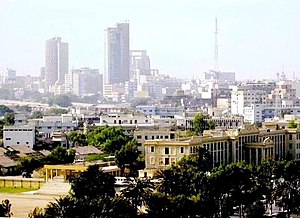The Census in Pakistan was planning to count multiple units in an apartment building as a single dwelling unit. This would have certainly affected the housing census counts in the cities where high rise units are becoming increasingly popular.
Even though the decision has been reversed, it suggests that Census is being conducted by those who may not have any past experience in the field. Perhaps, Pakistan may want to hire some Census officials from India who have recently completed the World's second largest Census.
Census body’s about-turn over house count unit | Newspaper | DAWN.COMCensus body’s about-turn over house count unit
By Habib Khan Ghori | From the Newspaper
April 2, 2011
KARACHI, April 1: In a step aimed at removing misgivings about the housing census, the Pakistan Census Commission has changed its decision of listing each residential apartment complex as one unit, citing that every flat will now be counted as a separate unit.
Reliable sources told Dawn on Friday that a formal notification in this regard was likely to be issued by the commission within 48 hours so that all enumerators were informed about the decision before the beginning of the first phase of census on Tuesday.
The decision of counting each flat as a separate housing unit is made after lawmakers expressed their scepticism over the census process during an hours-long briefing given to them by Chief Census Commissioner Habibullah Khattak, Federal Statistics Secretary Asif Bajwa and Joint Census Commissioner of Sindh Farooq Baloch.
Earlier, MQM Parliamentary Party leader Syed Sardar Ahmad during an assembly session had protested over the amendment made to the census rules, saying that it would be considered a deep conspiracy against millions of families residing in multi-storeyed flats.
When his comments were sought on the decision on Friday, Mr Ahmad said that the amendment was ridiculous and if they had revisited their decision it augured well for a fair census.
Regarding the shortage of staff for enumeration that was also pointed out during the briefing, the sources said that if the shortage of staff was felt in any city or district, the DCO and DDO Revenue concerned would increase the number of enumerators from the reserved manpower of five per cent being trained for the purpose. They said that the staffers would have completed their training by the time the housing census began.
Meanwhile, officials of the census commission gave a briefing to the DCOs, EDOs for Revenue and Education and DPOs from Karachi, Hyderabad, Thatta, Mirpurkhas, Badin, Tando Allahyar, Tando Mohmamad Khan, Matli, Matiari, Mithi and Jamshoro at a meeting called by Chief Secretary Abdus Subhan Memon on Friday.
The participants of the meeting were informed that the EDO and the DDO Revenue would be officials in charge of the population census in their respective districts.
The chief secretary directed the officials concerned to fully cooperate with the census officials and if any officer was found guilty of negligence, action would be initiated against them.
He also asked the DCOs to notify the sensitive areas and provide necessary security to the census personnel for discharging their duty without any fear.
“If they face any problem in discharging their duty, it should be brought immediately in the knowledge of the relevant higher authorities so that it is solved,” he said.
JI objection
However, the Jamaat-i-Islami has expressed concern over the census process to be carried out under the supervision of town administrations.
According to a statement signed by ex-lawmakers Muzaffar Hashmi, Laeeq Khan, Nasrullah Shaji, Hameedullah Advocate and Yunus Barai, the town administrations included many workers of the Muttahida Qaumi Movement whose political affiliation was known and fairness of the census process could not be expected if the census was carried out under their supervision.
This would jeopardise the entire exercise, they said, demanding that all political parties be made part of the census exercise. They added that such persons should be posted whose impartiality was beyond doubt.
 Image via Wikipedia
Image via Wikipedia

















